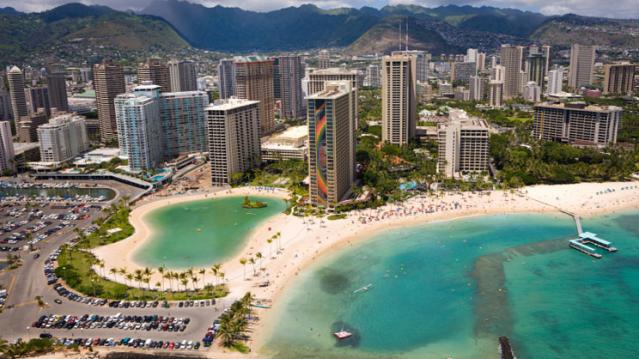The 10 Friendliest Cities in the U.S.

The friendliest city for visitors is Honolulu, according to more than 6,400 respondents in a newly released poll by Travelzoo.
Survey takers were asked to pick the cities, states and countries where they felt the most welcome, could easily ask for directions, and get dining recommendations. New York City came in second, followed by New Orleans.
Last year was a record-breaking year for tourism, and the numbers confirm the popularity of these destinations for travelers. In 2014, 8.3 million visitors came to the Aloha State, with total visitor expenditures estimated at $14.7 billion. On average, 205,044 visitors are in the state of Hawaii on any given day.
Related: They’re Leaving Las Vegas: Fewer I Do’s in Last Decade
New York City, where tourism also hit a record high in 2014 with 56.4 million visitors streaming into the Big Apple, claimed the second spot in the poll.
Third place New Orleans has 9.52 million visitors and tourism spending of $6.81 billion in 2014. Fourth place Las Vegas also broke tourism records with 40 million visitors last year, thanks to renovated and rebranded resorts and direct flights from Canada and Mexico. Boston rounded out the top five, with a total of 16,250,000 international and domestic visitors in 2014.
Here are the top 10 friendly cities:
- Honolulu
- New York
- New Orleans
- Las Vegas
- Boston
- San Diego
- San Francisco
- Charleston, S.C.
- Chicago
- Seattle
Travelzoo also ranked states for friendliness, with warm climes dominating the list. In the top spot was Florida, followed by California and Hawaii. New York and Maine were the only states from the Northeast to make the list.
- Florida
- California
- Hawaii
- New York
- Texas
- South Carolina
- Maine
- Georgia
- Washington
- Arizona
In Europe, Amsterdam, London, and Dublin were considered the friendliest cities to visit, with Italy and Ireland seen as the friendliest countries.
Tweet of the Day: The Black Hole of Big Pharma

Billionaire John D. Arnold, a former energy trader and hedge fund manager turned philanthropist with a focus on health care, says Big Pharma appears to have a powerful hold on members of Congress.
Arnold pointed out that PhRMA, the main pharmaceutical industry lobbying group, had revenues of $459 million in 2018, and that total lobbying on behalf of the sector probably came to about $1 billion last year. “I guess $1 bil each year is an intractable force in our political system,” he concluded.
Warren’s Taxes Could Add Up to More Than 100%

The Wall Street Journal’s Richard Rubin says Elizabeth Warren’s proposed taxes could claim more than 100% of income for some wealthy investors. Here’s an example Rubin discussed Friday:
“Consider a billionaire with a $1,000 investment who earns a 6% return, or $60, received as a capital gain, dividend or interest. If all of Ms. Warren’s taxes are implemented, he could owe 58.2% of that, or $35 in federal tax. Plus, his entire investment would incur a 6% wealth tax, i.e., at least $60. The result: taxes as high as $95 on income of $60 for a combined tax rate of 158%.”
In Rubin’s back-of-the-envelope analysis, an investor worth $2 billion would need to achieve a return of more than 10% in order to see any net gain after taxes. Rubin notes that actual tax bills would likely vary considerably depending on things like location, rates of return, and as-yet-undefined policy details. But tax rates exceeding 100% would not be unusual, especially for billionaires.
Biden Proposes $1.3 Trillion Infrastructure Plan

Joe Biden on Thursday put out a $1.3 trillion infrastructure proposal. The 10-year “Plan to Invest in Middle Class Competitiveness” calls for investments to revitalize the nation’s roads, highways and bridges, speed the adoption of electric vehicles, launch a “second great railroad revolution” and make U.S. airports the best in the world.
“The infrastructure plan Joe Biden released Thursday morning is heavy on high-speed rail, transit, biking and other items that Barack Obama championed during his presidency — along with a complete lack of specifics on how he plans to pay for it all,” Politico’s Tanya Snyder wrote. Biden’s campaign site says that every cent of the $1.3 trillion would be paid for by reversing the 2017 corporate tax cuts, closing tax loopholes, cracking down on tax evasion and ending fossil-fuel subsidies.
Read more about Biden’s plan at Politico.
Number of the Day: 18 Million

There were 18 million military veterans in the United States in 2018, according to the Census Bureau. That figure includes 485,000 World War II vets, 1.3 million who served in the Korean War, 6.4 million from the Vietnam War era, 3.8 million from the first Gulf War and another 3.8 million since 9/11. We join with the rest of the country today in thanking them for their service.
Chart of the Day: Dem Candidates Face Their Own Tax Plans

Democratic presidential candidates are proposing a variety of new taxes to pay for their preferred social programs. Bloomberg’s Laura Davison and Misyrlena Egkolfopoulou took a look at how the top four candidates would fare under their own tax proposals.


